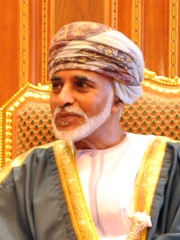
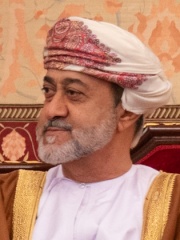
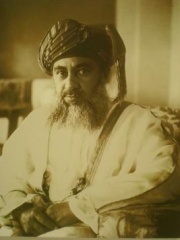
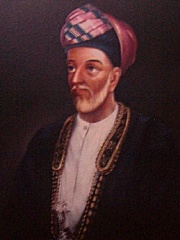


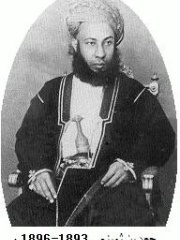

The Most Famous
POLITICIANS from Oman
This page contains a list of the greatest Omani Politicians. The pantheon dataset contains 19,576 Politicians, 11 of which were born in Oman. This makes Oman the birth place of the 147th most number of Politicians behind Guyana, and San Marino.
Top 10
The following people are considered by Pantheon to be the top 10 most legendary Omani Politicians of all time. This list of famous Omani Politicians is sorted by HPI (Historical Popularity Index), a metric that aggregates information on a biography's online popularity. Visit the rankings page to view the entire list of Omani Politicians.

1. Qaboos bin Said al Said (1940 - 2020)
With an HPI of 77.20, Qaboos bin Said al Said is the most famous Omani Politician. His biography has been translated into 83 different languages on wikipedia.
Qaboos bin Said Al Said (Arabic: قابوس بن سعيد آل سعيد, romanized: Qābūs ibn Saʿīd Āl Saʿīd, IPA: [qaː.buːs bin sa.ʕiːd ʔaːl sa.ʕiːd]; 18 November 1940 – 10 January 2020) was Sultan of Oman from 23 July 1970 until his death in 2020. A fifteenth-generation descendant of the founder of the Al Bu Said dynasty, he was the longest-serving leader in the Middle East and Arab world at the time of his death, having ruled for almost half a century. The only son of Said bin Taimur, Sultan of Muscat and Oman, Qaboos was educated in Suffolk, England. After graduating from the Royal Military Academy Sandhurst, he served briefly in the British Army. He returned to Oman in 1966 and was the subject of considerable restrictions from his father. In 1970, Qaboos ascended to the Omani throne after overthrowing his father in a coup d'état, with British support. He subsequently established the Sultanate of Oman. As sultan, Qaboos implemented a policy of modernization and ended Oman's international isolation. His reign saw a rise in the country's living standards, the abolition of slavery, the end of the Dhofar Rebellion, and the promulgation of Oman's constitution. Suffering from poor health in later life, Qaboos died in 2020. He had no children, so he entailed the royal court to reach consensus on a successor upon his death. As a precaution, he hid a letter which named his successor in case an agreement was not achieved. After his death, the royal court named his intended successor, his cousin Haitham bin Tariq, as sultan.

2. Haitham bin Tariq (b. 1955)
With an HPI of 72.69, Haitham bin Tariq is the 2nd most famous Omani Politician. His biography has been translated into 56 different languages.
Sultan Haitham bin Tariq Al Said (Arabic: هَيْثَم بْن طَارِق آل سَعِيد, romanized: Hayṯam ibn Ṭāriq ʾĀl Saʿīd; born 11 October 1955) is the Sultan and Prime Minister of Oman. He acceded to the throne in January 2020 after being named successor by his cousin, Sultan Qaboos bin Said. Prior to becoming Sultan, Haitham served for several decades under Sultan Qaboos in the Cabinet of Oman most notably as the Minister of Heritage and Culture.

3. Said bin Taimur (1910 - 1972)
With an HPI of 67.20, Said bin Taimur is the 3rd most famous Omani Politician. His biography has been translated into 34 different languages.
Said bin Taimur (Arabic: سعيد بن تيمور; 13 August 1910 – 19 October 1972) was the 13th sultan of Muscat and Oman from 10 February 1932 until he was deposed on 23 July 1970 by the British with the help of his son, Qaboos bin Said. He was a member of the Al Bu Said dynasty who in 1932 became the Sultan of Muscat and Oman, succeeding his father Taimur bin Feisal who had abdicated for financial reasons. The 21-year-old Said inherited an administration that was in debt. He consolidated power, with the help of the British, and regained control of the tribal interior, bringing together Muscat and Oman. Once the country was united, Said left the capital of Muscat and resided in a coastal town in Dhofar. Muscat and Oman became fully sovereign and independent states in 1951 with him as ruler.

4. Said bin Sultan, Sultan of Muscat and Oman (1797 - 1856)
With an HPI of 65.11, Said bin Sultan, Sultan of Muscat and Oman is the 4th most famous Omani Politician. His biography has been translated into 25 different languages.
Sayyid Saïd bin Sultan al-Busaidi (Arabic: سعيد بن سلطان, Saʿīd bin Sulṭān, Swahili: Saïd bin Sultani) (5 June 1791 – 19 October 1856) was Sultan of Muscat and Oman, the fifth ruler of the Al Bu Said dynasty from 1804 to 4 June 1856. His rule began after a period of conflict and internecine rivalry of succession that followed the death of his father, Sultan bin Ahmad, in November 1804. He is often referred to as the Lion of Oman (أسد عمان), as one of the greatest Omani sultans. Said's uncle Qais bin Ahmad finally agreed to Said's primacy after Said had killed his cousin, Badr bin Saif, a pretender to the throne. Said is noted for moving his capital to Zanzibar, where it remained during the time when the Omani Empire reached the zenith of its power and wealth.
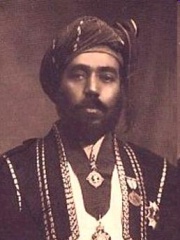
5. Taimur bin Feisal (1886 - 1965)
With an HPI of 63.94, Taimur bin Feisal is the 5th most famous Omani Politician. Her biography has been translated into 23 different languages.
Sultan Taimur bin Faisal bin Turki Al Said (Arabic: تيمور بن فيصل بن تركي; 1886 – 28 January 1965) was the Sultan of Muscat and Oman from 5 October 1913 to 10 February 1932.

6. Sultan bin Ahmad (1800 - 1804)
With an HPI of 58.39, Sultan bin Ahmad is the 6th most famous Omani Politician. His biography has been translated into 16 different languages.
Sultan bin Ahmad al Busaidi (died 1804) was the Sultan of Oman, the fourth of the Al Bu Said dynasty, ruling the country between 1792 and 1804.

7. Salim bin Thuwaini (1845 - 1876)
With an HPI of 58.07, Salim bin Thuwaini is the 7th most famous Omani Politician. His biography has been translated into 16 different languages.
Sultan Salim bin Thuwaini Al Busaidi (Arabic: سَالِم بِن ثُوَيْنِي آل سَعِيْد, romanized: Sālim bin Ṯuwaynī Āl Saʿīd) was the Sultan of Muscat and Oman from 11 February 1866 – October 1868. He was the eldest son of Sultan Thuwaini bin Said and his wife Sayyida Ghaliya bint Salim Al-Busaidiyah, and acceded to the throne in succession to his father. Lewis Pelly and Henry Bartle Frere were deeply disappointed by the death of Sultan Thuwaini bin Said in their hopes for a military action against the Wahhabis, and were well aware of Salim's opposing views and refusal to join the ensuing war. Hence the British Political Resident General in the Gulf at Bushehr, Colonel Lewis Pelly, fiercely opposed the recognition of Salim whom he feared was to stop foreign interference and forge a peace deal with the Wahhabis. Salim sent two envoys to Bombay, then under British rule, with a letter soliciting the renewal of relations between the British and Muscat Governments and reiterating his assertions regarding his father's death, namely, that he had died as a result of illness after three days of suffering and was quickly buried in accordance to Islamic tradition, to which the Government of India acknowledged the reigning prince as sultan in May 1866. Pelly tried to intervene and accused him of patricide through innuendo but was forestalled by the British Viceroy John Lawrence, 1st Baron Lawrence who presented Salim with his government's official recognition. In September 1868, Azzan bin Qais, Salim's brother-in-law and distant relative was elected imam by disgruntled tribesmen seeking to lead the country back to the principles of classical Ibadhi state, Azzan led his followers in a rapid series of raids on the Barkah, Mutrah and Muscat forts. With no support, Salim could not hold center and was forced to flee to one of the harbour fortresses. In his precipitate flight, he left his valuables behind together with many heirlooms of the dynasty, all of which were either plundered or destroyed by the invaders. On 11 October 1868, Salim embarked on his ship The Prince of Wales and sailed for Bandar-Abbas, from there he made several failed attempts to recover his lost dominions between October 1868 and March 1869. He made a final bid for the throne in 1875, however by that point, the British had formally recognized his uncle Turki bin Said as the new Sultan. Salim was captured and expelled aboard H.M.S.Daphne and was exiled to a fortress in Hyderabad, Sindh until he died of smallpox on 7 December 1876.

8. Hamad bin Thuwaini of Zanzibar (1857 - 1896)
With an HPI of 57.30, Hamad bin Thuwaini of Zanzibar is the 8th most famous Omani Politician. His biography has been translated into 20 different languages.
Sayyid Hamad bin Thuwaini Al-Busaidi (Arabic: حمد بن ثويني البوسعيدي) (c. 1857 – (1896-08-25)25 August 1896) was the fifth Sultan of Zanzibar. He ruled Zanzibar from 5 March 1893 to 25 August 1896.

9. Said bin Ahmad (1800 - 1810)
With an HPI of 55.80, Said bin Ahmad is the 9th most famous Omani Politician. His biography has been translated into 16 different languages.
Said bin Ahmad (died 1803) was briefly the Imam of Oman, the second of the Al Bu Said dynasty, ruling the country between 1783 and 1786.
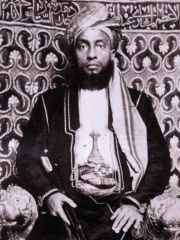
10. Ali bin Said of Zanzibar (1854 - 1893)
With an HPI of 55.38, Ali bin Said of Zanzibar is the 10th most famous Omani Politician. His biography has been translated into 16 different languages.
Sayyid Ali bin Said al-Busaidi, GCSI, (c. 1854 – March 5, 1893) (Arabic: علي بن سعيد البوسعيد) was the fourth Sultan of Zanzibar. He ruled Zanzibar from February 13, 1890, to March 5, 1893. In June 1890 he was forced to accept a British protectorate over his dominions. He was succeeded by his nephew, Hamad bin Thuwaini Al-Busaid.
People
Pantheon has 11 people classified as Omani politicians born between 1797 and 1990. Of these 11, 2 (18.18%) of them are still alive today. The most famous living Omani politicians include Haitham bin Tariq, and Theyazin bin Haitham. The most famous deceased Omani politicians include Qaboos bin Said al Said, Said bin Taimur, and Said bin Sultan, Sultan of Muscat and Oman. As of April 2024, 1 new Omani politicians have been added to Pantheon including Theyazin bin Haitham.
Living Omani Politicians
Go to all RankingsDeceased Omani Politicians
Go to all RankingsQaboos bin Said al Said
1940 - 2020
HPI: 77.20
Said bin Taimur
1910 - 1972
HPI: 67.20
Said bin Sultan, Sultan of Muscat and Oman
1797 - 1856
HPI: 65.11
Taimur bin Feisal
1886 - 1965
HPI: 63.94
Sultan bin Ahmad
1800 - 1804
HPI: 58.39
Salim bin Thuwaini
1845 - 1876
HPI: 58.07
Hamad bin Thuwaini of Zanzibar
1857 - 1896
HPI: 57.30
Said bin Ahmad
1800 - 1810
HPI: 55.80
Ali bin Said of Zanzibar
1854 - 1893
HPI: 55.38
Newly Added Omani Politicians (2025)
Go to all RankingsOverlapping Lives
Which Politicians were alive at the same time? This visualization shows the lifespans of the 9 most globally memorable Politicians since 1700.


